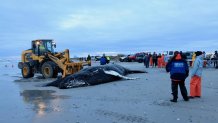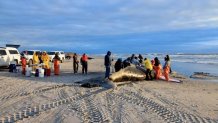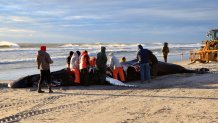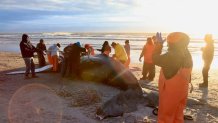Several dead whales have washed up along the coast of New Jersey and New York in recent months. Now, the discoveries are prompting calls for the federal government to launch an investigation as to why this is happening. NBC10’s Ted Greenberg has the details.
A whale that was found dead on a New Jersey beach last week was likely struck by a vessel, investigators determined.
The female humpback whale, which was 32 feet and 7 inches long and weighed about 12 tons, washed up on the North End Natural Area in Brigantine, New Jersey, on Thursday.
Stream NBC4 newscasts for free right here, right now.


We have the news you need to know to start your day. Sign up for the First & 4Most morning newsletter — delivered to your inbox daily.


Members of the Atlantic Marine Conservation Society (AMCS), the Marine Mammal Stranding Center (MMSC), Mystic Aquarium and MERR Institute conducted a necropsy on the whale. Preliminary results suggested the whale suffered blunt trauma injuries consistent with those from a vessel strike.
U.S. & World
The day's top national and international news.
The investigators found injuries and hemorrhaging on the whale’s head and thoracic region as well as along the right side and the pectoral flipper.
The findings will be confirmed through laboratory analysis, officials said.
“Blubber thickness indicated that the whale was in good condition,” Madisen Young, an administrative assistant with the MMSC, said. “The whale’s stomach was full of partially digested fish and there was fecal matter in the intestines, indicating the whale had been actively feeding prior to these injuries.”
Other dead whales have also turned up in coastal areas of New Jersey and New York. Scientists say there has been an increase in whale sightings closer to the coast over the past several years.
“That also happened to coincide with an increase in the number of animals that we’ve seen washing up on our shores,” Rob DiGiovanni, of the Atlantic Marine Conservation Society, told NBC10.
Environmental advocates and other groups want to know if offshore work related to planned ocean wind farms has anything to do with the whale deaths. In a letter, they called on President Joe Biden to launch an investigation.
"Vessel strikes and entanglement in fishing gear are the largest known human threats to whales of all species,” Young said. “Although there has been speculation about whether these whale deaths are linked to wind energy development, at this point no whale mortality has been attributed to offshore wind activities. We will continue to gather data and go where the science leads us.”
Young also issued a warning to boaters.
“There are currently a high number of large whales in the waters off New Jersey, likely attracted by prey (small fish) that are also attracting stripers, so we advise boaters to go slowly (less than 10 knots) and keep a lookout for whales,” Young wrote. “There is currently a voluntary slow zone in effect for the waters off New York and New Jersey. There are also active Seasonal Management Areas (where all vessels 65 feet or longer must travel at 10 knots or less) off the ports of New York/New Jersey and Delaware Bay."



